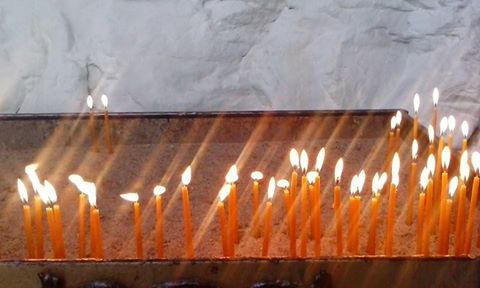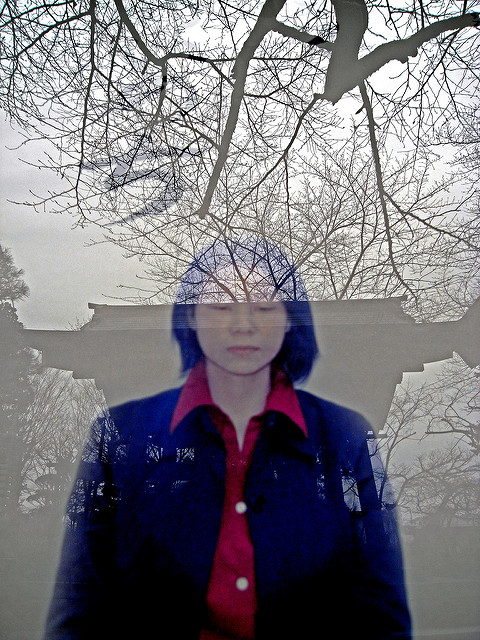
Many people think of whores as being as far from God as possible. We are seen as “fallen women,” people whose moral deficiency has put them at odds with God. When God, morality, and religion are discussed in tandem with sex work, these conversations often promote religious dogma which serves to justify the marginalization of sex workers. Sex workers are rarely heard from on their own relationships with religion or spirituality, even though we have roots in religious and spiritual life as far back as Biblical times, with Rahab of Jericho and the Empress Theodora standing out as two early examples of celebrated historical religious sex workers.
Ideas of “morality” and “decency” inform the rule of law in the United States. Narratives around sex work and morality as defined by “God”—specifically, white Protestant notions of God—often allow punitive laws against sex work in the U.S. to persist. Yet, when asked about their own relationships to a higher power, many sex workers discussed relationships with monotheistic forms of religion:
“I was raised by my dad, who grew up Catholic but is probably an atheist or at least agnostic,” West Coast escort and stripper Red recounts. “My mom was a frummie (very, very very orthodox Jewish) convert in her youth who loosened up a lot and that was the only religion I got. I didn’t live with my mom so I only went to Hebrew school the once and shul a handful more times, but I saw her on weekends so we did Shabbos, either at hers or her friends, and that stuck with me.”
“But when I was a teenager I got really depressed,” she continues,” and during that [period] I read this biography of Muhammad that said that the whole point of Islam (and also Judaism) was to leave the world better than you found it. I found out later that in Hebrew this is called tikkun olam and it’s a Thing, it’s the whole point of everything, but …that’s not what 6 yr old me got out of Hebrew school or shul for sure! It was a revelation. And it saved my life and continues to save my life since my therapist insists we can’t opt out and I have a duty to stay alive and keep trying to make things better however I can. ”
Others described less orthodox relationships to a higher power:
“My conception of a higher power is a feminine energy, which for lack of a better word I call Gaia,” Oakland street and internet-based worker Keika explains. ”She is not associated with any organized religion. She is the spirit of the universe whom I meditate and pray to. I can turn to her like others turn to God.”
“I first discovered Buddhism when a neighbor had a Buddhist boarder who taught me and my friends how to chant nom yo ho renga kyo,” independent massage worker Julee Deree of San Francisco recounts. “As I grew into my teenage years and a body that looked like a Playboy centerfold at a very young age (tall, long legs, huge boobs), I used chanting to help me deal with the unwanted sexual attention that I was getting, and generally to calm me down during times of stress.”
One common thread in sex workers’ descriptions of their relationships to higher powers is the way sex workers’ resilience and resourcefulness are reflected through these relationships.
“I can remember when I asked Jesus to come into my heart,” escort and dominatrix Krystina Hartman of Anaheim, CA recalls. “I was locked up and hiding under my covers. I prayed for salvation and I was so sorry for everything I had done. To myself as well as others. As I lay there on a cot, I felt incredibly warm. It was like Jesus was wrapping his arms around me and assuring me that despite all the bad shit, all the drugs, all the prostitution…everything…I was loved and I was forgiven.”
“I used to think I had to be praying all the time, that there was this religious ideal I was supposed to be aiming for,” Orange County ex-escort Meg Vallee Munoz remembers. “Then I realized that the people with the spiritual lives I admired and looked up to the most were just as confused, fucked up, and imperfect, but still yearning just like me … I found great freedom to be myself and learned to love my journey in that.”
“I don’t believe in a singular higher power,” says Deree, “but I do have a personal relationship with several Bodhisattvas and with most of the lineage holders of the four sects of Tibetan Buddhism. I have only met a few of them in person, and several of them are complicated deities that appear in multiple forms, such as my main Bodhisattva Tara.”
”Currently, I’m working with Green Tara, which is a youthful version of Tara that is very action-oriented,” she explains. ”I’m working with her because I am building a business and working on social justice issues, and I need to be ‘activated.’ Green Tara is very activating. I can summon Tara to be with me at any time, and I have summoned her in dreams and during illness.”
Moral ideas about sex workers in America are tied in with victimization and the traditional American-Christian narrative that “a good woman” is just the sexual extension of a man. She is never sexually whole unto herself, and she never deserves her own sexuality. One issue faced by sex workers is that since many religious dogmas have centered around women, in particular, as the holders of sexual morality, it is thus the sex worker’s place, whatever their gender identity, to hold that societal moral baggage. With all this symbolic weight piled on top of them, it is often very difficult for sex workers to feel like they can be free of these societal expectations.

“Other people think that because I’ve done certain things or lived a certain way that that means I can’t be spiritual or that my connection to my spirituality is a joke,” stripper Nadia Yasmeen says. “They think it’s hypocritical to practice my religion and then turn around and do something they find to be immoral. I don’t trust the value system of somebody else to apply to my life because my life isn’t their life. It’s actually because of my experiences and because of the many supernatural things I’ve seen which gives me belief and faith in a higher power because they can’t be explained in normal people’s definitions.”
“[I]n the past, when I worked as a street- based sex worker, spirituality was not part of my life as much,” Keika relates. “My concept of a higher power has grown and morphed into what I know today over the past few years. I was actively in my addictions and on the streets just over 10 years ago. Spirituality was far down the list, as survival and feeding the monkey on my back were a bit more of a priority. At that time, I didn’t expect to live very long. I didn’t expect to see past 25. I tried to commit suicide at 21; almost successfully. Very close indeed.”
“My values and morals/expectations were different then,” she explains. ”… I try to have compassion for others, and in general, don’t think it’s my business what others do with their bodies. I do believe our society still has a negative perspective when thinking about sex work as employment with free agency. Somehow the compassion or understanding for people in this trade is lost when you don’t claim the victim/survivor role. I guess it takes away their capes.”
Sex workers often use God, religion, and spirituality as harm reduction tools. Our use of our belief systems to keep ourselves safe demonstrates our ingenuity.
“There have been plenty of times where I listened to my intuition and it kept me out of trouble,” Yasmeen says, “whether that was legal trouble with the police, trouble with a bad client/customer or any other trouble I could have gotten into. I consider my intuition a gift from God. I use crystals for protection and prosperity and I consider them also gifts from God. Even birds have flown by to alert me to danger before.”
“So I see everything in my Creator’s dominion conspiring to support me and keep me safe,” she concludes, “and I know it’s because of my strong spiritual connection to it all.”
Hartman discusses the fear that can come with survival sex work as an impetus to connection with God: “I prayed all the time. I prayed that the person I was meeting would not kill me. I prayed that the coke I was snorting up my nose would not kill me.”
But God and religion are also topics many sex workers feel ambivalent about:
“[My religious beliefs] caused me to feel ashamed and conflicted a lot at first,” sex worker Autumn Rose of Toronto recounts. “I’d separated the two [sex work and religion] entirely. Eventually, I came to smack them together like chalk brushes and in the dust I found I became more patient with my clients and with other workers. That being said, I also accepted that I was a person with rights and boundaries who deserved to be respected and safe in my work. I’m a practicing whore.”
Sex workers use faith and spirituality to get through hard times, as inspiration, protection, and comfort. Sex workers also question God and religion and struggle with concepts of faith. In other words, a sex workers’ spirituality may not be that different from a lay person’s. What does seem to stand out in our religious and spiritual observances is sex workers’ ability to utilize their faith or spirituality to enhance and complement our occupational strategies to maintain health and safety.
Yasmeen describes how her God would react upon hearing stories about her sex work: “Talking to God lets me know that I don’t have to be ashamed of the things I did to survive. Me surviving is part of God’s plan for me—I wasn’t sent here to perish before completing my mission, and if it wasn’t for the work I’ve done and the money I’ve made I wouldn’t have been able to support myself, even though some of my experiences have left me with intense trauma. Upon hearing my stories, God would wrap me up in love and acceptance, absorbing my traumas and healing my wounds.”

Father David Gilmore, St Anne’s Church Soho – Rape and Prostitution – A Question Of Consent
Beautifully written!
Yasmeen has it right!
This was really good. Love this kind of reporting. Thank you.
As a former sex worker who also wear’s the victim/survivor cape (I was both) I can atest to carrying great guilt until understanding the beauty and power of God’s love for me. Then going back I remember how many times prayer rescued me from death, rape and jail. It’s why I wrote my first play “God Loves Prostitutes” which I knew would be controversial but I didn’t care. Because God is love, he loves me despite what I did, currently do or may habe do and that includes sex work.
Very well written. I know plenty of sex workers who believe in God or a Higher Power. I believe sin is for the most part imperfection. So God forgives you if you accept him in your ❤ heart. Some may not agree with this but that is OK. I think we should all believe in something if not God it could be Mother Nature or karma. But most of all we should definitely believe in ourselves. Life is precious and I thank God everyday I am alive and healthy.